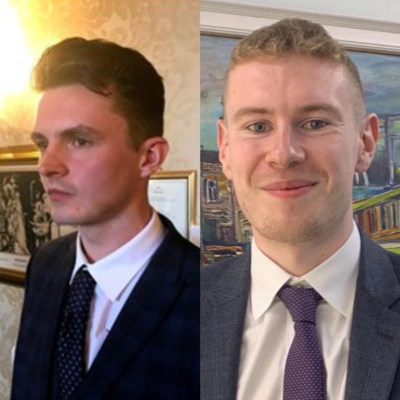Working towards a more accessible and equitable profession
Ahead of International Day of People with Disabilities on 3 December, we spoke with trainee solicitors Fraser Mackay and Thomas McGovern to find out more about their plans and progress in setting up a group to support disabled solicitors and law students.
The theme for IDPWD 2022 is Transformative Solutions for Inclusive Development: the role of innovation in fuelling an accessible and equitable world, a theme which resonates with Fraser and Thomas’s plans.
Both noted that the move to online and remote options for studying and working have been a game changer for disabled people – simple measures like recording lectures made a big difference.
Similarly, in the workplace, a recent study published by the Work Foundation think tank at Lancaster University found that over 80% of disabled workers agreed that remote working would either be essential or very important when looking for a new job.
Fraser, a trainee with the Scottish Social Services Council, was diagnosed with dyspraxia at age 10. Dyspraxia is a developmental co-ordination disorder that affects movement and co-ordination. Fraser described how initial expectations at standard grade level had transformed during Highers through self-learning using a laptop, increased physical activity, additional tutoring and family support. Fraser described how a big step in this journey was understanding how he learned best and family supporting teachers to implement adjustments.
Moving onto university for his first degree, the battle to get the support he needed started afresh. A decision to study law meant a move to another university where again he had to go through the process of obtaining the adjustments he needed. Fraser comments that this is a common issue for people with disabilities moving through education, as the administrative difficulties in seeking additional support, including learning support assessments, can often be difficult to balance with the pressures of studies.
The Higher Education Commission (HEC) writes: “We found that disabled students face a number of additional pressures in comparison to non-disabled students, including the heavy administrative burden created by having to apply for, be assessed for, organise and chase up the support they need.” Fraser’s experiences in education have driven him to make things better for aspiring and fellow solicitors, a key factor in his decision to establish a disability group in the profession.
Thomas is a trainee with a criminal legal aid firm and appears regularly in court. He was diagnosed with dyslexia when he was seven. Dyslexia is a learning difficulty that primarily affects the skills involved in accurate and fluent word reading and spelling, but it doesn’t only affect these skills. Thomas struggled initially at school but flourished academically once he received the support he needed. Even so, he recalls a bad experience when a teacher singled him out in class and announced to everyone why he was being treated differently – their reason being that other students would complain he is getting better treatment than them and they had a right to know.
Like Fraser, he also experienced having to repeat the process of obtaining adjustments, and towards the end of his degree found out that he had been consistently marked down for his grammar and spelling despite his lecturers being aware of his dyslexia diagnosis. In the workplace he has faced stigma – one instance when he was told he was “unprofessional” for using his mobile phone in court for his notes, when it was necessary as he struggles with reading handwritten information.
Thomas’s experience has led him to the conclusion that making adjustments is not enough – removing the stigma around disability is as important. His view is that blanket policies which are applied in education end up not meeting anyone’s needs, and places limits on resources that are available.
Their experiences have led to their aspirations to develop a group to support others. The group is still developing – a first meeting has not been held, so the name of the group, aims and objectives, will be agreed at that stage. The group has a core of 30 to 40 people from across the profession, from fellow trainee solicitors to senior associates and legal partners from law firms, with the enthusiasm to carry it forward.
Fraser and Thomas are keen to have a diverse membership of the group (people from all backgrounds – disabled or otherwise – are welcome) and they want to engage with anyone who want to make a change. Allies are very welcome.
They plan to set up a meeting with those who have already noted their interest very soon. Both emphasised that this is great time to get involved as this is an opportunity to shape the group and its future. The Law Society of Scotland has already helped a little in these formative stages and looks forward to a positive relationship in the future.
If you are interested in joining the group please contact Fraser at frasermackaylaw@gmail.com

